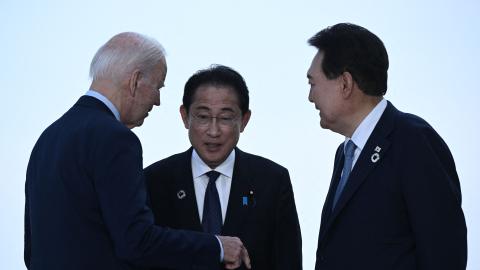President Biden will meet on Friday with the leaders of South Korea and Japan, President Yoon Suk Yeol and Prime Minister Fumio Kishida, in Maryland to discuss the future of the trilateral partnership.
South Korea and Japan are two of America’s most important allies in the Indo-Pacific. Together, these countries host more than 75,000 American troops and are essential trade and investment partners. Billions of dollars each year flow between American, South Korean and Japanese investors and businesses who are confident in each country’s manufacturing, financial and other services.
Although economic issues, such as the growing demand for economic security, may come up during the Biden-Yoon-Kishida summit, traditional security will forever remain the outstanding issue for these three countries. Respective mutual defense agreements ensure that American and Asian security interests are intertwined.
Some concerns in the Indo-Pacific never change. North Korea continues to fire missiles into the East Sea and the Pacific — some being sent over the islands of Japan as a clear provocation. This year, North Korea has conducted roughly a dozen missile tests, and more are likely to come around the time of this meeting as a sign of protest. North Korean officials don’t like it when South Korean officials are getting along with American or Japanese officials.
Each missile launch by North Korea arguably takes the country one step closer to having a successful delivery system for its nuclear weapons aspirations. North Korean leader Kim Jong Un has threatened to boost production of nuclear weapons, but what he would do if the regime ever acquires a substantial nuclear arsenal is up in the air. Regardless, when President Biden hosted President Yoon at the White House earlier this year, both affirmed that a nuclear attack on South Korea would be akin to an attack on the U.S. and that the U.S. is willing to use its own nuclear arsenal to help deter that kind of aggression.
But times in the Indo-Pacific are also changing. Last year, Japan’s National Security Strategy noted that security in the region is as severe and complex as it has ever been since the end of World War II. North Korea is always the apparent threat to peace in the Indo-Pacific, but a new challenger has emerged from over the horizon. For years now, the U.S. has identified China as the only competitor with both the intent to reshape the international order and the means to do so, and other governments around the world are starting to acknowledge this reality.
South Korea’s new National Security Strategy, released just a couple of months ago, noted that China continues to expand its military capabilities and extend its political and economic influence around the world. Japan’s same National Security Strategy also recognized China as having a clear goal to build its army into one that’s “world-class,” while unilaterally attempting to change the international rules and norms.
Beijing’s growing belligerence, its use of economic coercion and unashamed military expansion, has helped breathe new life into the trilateral relationship between the U.S., South Korea and Japan. And the good news for these three countries is that efforts to deter North Korea from taking military action can also deter China, the North’s security partner.
The challenges that China presents, however, including its massive economic presence in the Indo-Pacific and use of non-traditional military means, make these efforts between the U.S., South Korea and Japan more complex — but necessary. It’s why the Biden administration has been so adamant about engaging more with American partners and allies in the Indo-Pacific.
It’s important for the U.S. and its partners and allies to work respectively and together to address China’s malign influence. The international rules and norms we’ve shared for the past decades have allowed Western and Asian countries, including China, to flourish and grow. But now Beijing is turning inward, toward a more opaque form of government. China wants to be associated with the organizations that were built around these rules and norms, like those of the United Nations, but doesn’t necessarily want to be beholden to those agreements anymore.
As much as China will be of interest at this week’s Camp David summit, the meeting is just as important as the actual substance of discussion. That’s because South Korea-Japan relations have always been a bit on-again, off-again. Before the Yoon administration, relations were particularly unstable. But Yoon showed a unique desire to try to bridge this tepid relationship even before coming into office. It’s apparent now that he and Kishida are willing to put in the work necessary to get things back to normal.
It’s not clear where South Korea-Japan relations will be a few years from now. That’s why it’s important to continue regular meetings between the U.S., South Korea and Japan to ensure there’s momentum when administrations change. This and other meetings that these three leaders are having aren’t just about showing the political will to make changes; they also influence how their governments think about the trilateral relationship.
It’s important to lock in commitments and initiatives now — whether on information sharing, new joint exercises, research projects and so on — to ensure long-term results from the efforts that Biden, Yoon and Kishida are putting in. The security interests of the U.S., South Korea and Japan around the Indo-Pacific, including economic, cyber and space, transcend politics.
The political leadership in each country eventually will change but the challenges that North Korea and China present don’t appear to be going away anytime soon.















